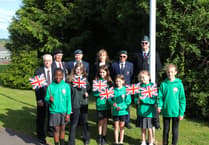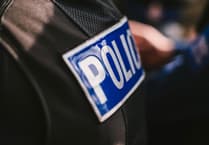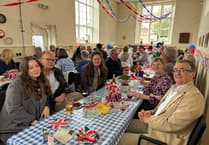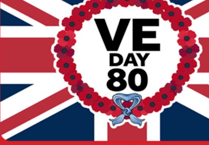THE service on Remembrance Sunday, November 10, at Crediton Methodist Church was led by Mary Hext.
As well as remembering the past, we were also looking forwards.
First of all, remembering and looking back. We use many things to help us remember – we might tie a knot in a handkerchief, put a note on the front door, have an alert on our phone, or write a message on our hand. Today we have a red piece of paper or cloth – a poppy – to help us remember.
Second Lieutenant Ewart Richardson from the Yorkshire Regiment wrote about an experience he had in the First World War.
He was with a working party in the trenches and they went up the communication trench. As he walked, he noticed that it was a thing of beauty because on the earth piled up the sides of the trench were growing white daisies (a friend later told him they were camomile flowers) and red poppies.
Poppies became a symbol of remembrance through the poem in Flanders Fields the Poppies Grow.
It is important that we do remember.
As a teacher, over the years I have had the privilege of taking young people to visit first and second World War graves in Holland and Belgium.
The effect of this on the young people is incredible and very moving.
Once we were on the long journey from Holland into Belgium and going to stop at Essex Farm.
As I sat at the front of the coach I became aware that there was a lot of discussion amongst the boys on the back seat – so I kept an eye on them!
The plot thickened when we made a toilet stop at a service station. They went very covertly into the shop.
It was Valentine’s Day and they bought up all the red roses they could find.
When we stopped at Essex Farm these young men put a single red rose on the graves of each of the unknown soldiers. They told me that the named graves would have family to remember them and perhaps visit, but the unknown soldiers had no-one to remember them – so they wanted to remember.
I must admit that the sight of my 18 year-old boys laying red roses on the graves of the unknown soldiers, many of them 18 year-old boys some 100 years ago, was very moving. We will remember them.
Another place on the trip was the war cemetery at Oosterbeek just outside Arnhem.
The inscriptions on some of the graves are very moving.
You remember that the death of each soldier is impacted on many – mothers, sisters, wives, children – all affected by that death.
It brings the pain and cost of war and the sacrifice they gave. These words are written on the graves of unknown soldiers – “Known unto God”.
As we remembered all of those who sacrificed and served for us, we remembered that all are known by God.
All those buried in the ground in France, Holland and Belgium, all those buried in the rubble of Gaza, all those taken hostage and killed by Hamas, all of those who are known to us as we remember, and each one of us, is known to God.
If we only look back at the sacrifice and horror of war, we are not fully observing remembrance, We are also called to look forwards.
The words of the philosopher Santayana are written on the wall of the death damp in Auschwitz “Those who forget the past are condemned to repeat it”.
Pope John Paul II said of the bombing of Hiroshima “To remember the past is to commit ourselves to the future but to remember Hiroshima is to commit ourselves to peace”.
At a German First World War cemetery where 44,000 German soldiers are buried, is written on the graves “these soldiers are ambassadors of peace”.
If we are not careful the flame of remembrance can keep hatred and bitterness alive if we fail to press for peace.
There is a huge statue of Christ that stands in the Andes mountains between Chile and Argentina.
The countries were once on the brink of war over a land dispute. Preparations for war were being made and armaments we being produced.
On Easter Sunday bishops in both countries preached peace in the name of Christ.
People did not want war and both governments were overwhelmed with the calls for peace from their people. Talks were held and war abated.
The guns that had been prepared for fighting were melted down in the furnaces and made into a huge bronze statue of Christ.
It stands on the mountains between the two countries and underneath are these words “These mountains will turn to dust before the people of Chile and the Argentine forget their solemn covenant sworn at the foot of Christ”.
We remember and give thanks for service and sacrifice, but we also remember that we have all been called to be peace makers.
In our world of darkness and pain, here we sit in Crediton Methodist Church and perhaps it is our voice that is missing as we call for peace.
WE WILL REMEMBER
Bronwyn Nott





Comments
This article has no comments yet. Be the first to leave a comment.